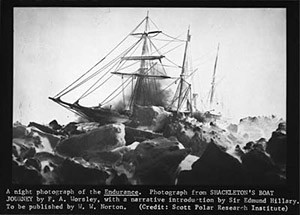Leaders who have the perspective of being a servant leader will succeed long term. Leadership is naturally outward facing. At its best, it is about empowering people to serve others. It’s about taking the power that we could use to build our own ego and instead, using it for the good of our teams and our customers. The more often that we can focus on serving others and in some ways, minimalize our own wants, needs, and desires, I believe that we will be better leaders.
One of the best true stories of all time about what it means to be a servant leader is the 1914 story of explorer Sir Ernest Shackleton and the 27 men who were determined to cross Antarctica from sea to sea, via the South pole. They had the goal of being the first to traverse the Antarctic continent. Unfortunately, the ship broke apart in the ice and the men were stranded without shelter for nearly two years.
Shackleton expressed his leadership via his concerns about the crew’s morale. He knew that idleness can lead to depression, so he kept them on their research duties, and also kept them as active as possible with games of football and hockey. As they were making their escape to South Georgia Island, Shackleton gave the men regular meals and drinks of hot milk every four hours and the routine gave the men stability and something to look forward to.

He always thought of the needs of his men above his own, and he was always ready to sacrifice his own comfort for others.
Servant leadership is about wanting to help others above all else.It is about identifying and meeting the needs of colleagues, customers, and communities before your own and without expectations that you will receive any “payback”.
Perhaps surprisingly, servant leadership actually requires a combination of an inward focus and an outward focus, as well as the primary focus on others. Inward focus helps you know what unique talents, skills and values you bring to the work and the relationships. Focusing outward can improve your ability to intentionally devise strategy, innovations, and applications consistent with what your team, customers and clients would like. Both create the foundation of focusing on the unique needs of others as a servant leader.
How do you assess your abilities as a servant leader? Start with these key questions:
Who are you serving?
Why are you serving them?
What are their unique needs?
How will you serve these clients, community, others with your unique abilities?

Always on point Peter! Great story!
Well written and nicely said.